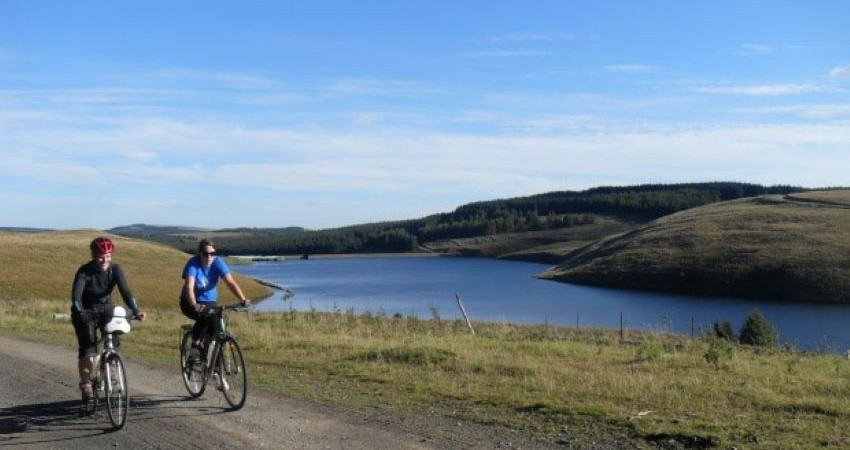
Sustrans Cymru on… how ditching the car can help protect the environment
15 July 2021As roads fell quiet during the Covid-19 pandemic, many of us embraced active travel as a part of our daily routines. To explore the importance encouraging walking, cycling and other sustainable travel options beyond the pandemic, we have partnered with long-term Traveline Cymru friends, Sustrans Cymru, to create a guest blog series. This work is vitally important as we face the ongoing climate emergency and consider the role active and multi-modal travel behaviours will play in years to come.
One of our key aims at Sustrans Cymru is to lessen car dependency. With the increasing awareness of the impact motorised vehicles are having on the climate emergency, changing the way we travel can play a big role in helping to protect the environment.
It's now widely agreed that unless we make some big, systematic changes, climate change is going to get rapidly worse. And so will its effects on our everyday lives.
This requires transformation within many of society’s big systems, like energy, fashion, food and travel.
Here are five ways that choosing to travel sustainably can help save our planet:
1. Reduction in air pollution
Motorised road transport contributes to air pollution through its use of fuels. Which includes carbon dioxide (CO2), nitrogen dioxide and particulate matter.
These have an impact on our health and on the health of the planet.
For example, CO2 traps heat into our atmosphere. The warmer our atmosphere gets, the harder it is for us to live in a healthy and happy way.
By choosing to walk, cycle or take public transport for a journey rather than using a private car, you are helping to reduce air pollution.
2. Creates a need for more green spaces
If more people walk or cycle, we will need more traffic-free spaces.
And many of these will be green spaces. Areas with trees, plants and wildlife. This is important for the environment because trees and other plants take some of the carbon dioxide out of the air.
They, therefore, reduce our carbon emission levels and increase clean air.
Better air quality and green, open spaces are not only good for the environment but they're also good for our physical health and for our mental health too.
Access to the outdoors and being able to move safely around local areas have also never been more important than throughout the Covid-19 pandemic.
An increase in demand means that local governments can work to re-design our cities and towns for the health and safety of the community.
3. Boosts biodiversity
Biodiversity refers to the number and types of plants and animals that exist in a particular area. It describes all life on earth and how it interacts with each other.
High levels of biodiversity are crucial for many reasons. A healthy ecosystem is responsible for the quality and variety of our food, as well as the quality of our air and water.
Climate change is greatly affecting the amount of biodiversity we have on earth. As the temperature gets warmer and the weather gets more unpredictable, fewer plant and animal species can survive.
Switching to walking or cycling for more of our shorter journeys helps to protect biodiversity. It creates less noise, less air pollution, and results in fewer emissions that are warming the atmosphere.
4. Reduces noise pollution
Noise pollution is unwanted or disturbing sounds that affect the health and wellbeing of humans and animals.
Studies show that noise pollution affects the ability of local wildlife to survive.
Animals have to alter their behaviour and locations to avoid noise pollution. And these changes have a knock-on effect on our whole environment.
When certain birds leave a certain forest, that forest may start to decline. This is linked to biodiversity and shows the complex, natural systems our environment requires.
Walking, cycling and taking public transport helps to reduce the number of motor vehicles using the roads, lowering congestion and the noise that comes from engines.
Less noise from vehicles and idle traffic helps local wildlife to stay and thrive.
5. Inspires behaviour change
Choosing more active and sustainable ways to travel has important benefits for us as individuals. Staying active is good for our physical health and can also help to boost our mood and improve general wellbeing.
When you make a commitment to travel sustainably, those around you will see the difference you're making. By inspiring others around you to walk and cycle and chose public transport, we will start to build a ‘new normal’.
As more people ditch the car, we’ll help build momentum and demand for better access to safe, sustainable, traffic-free environments.
At Traveline Cymru, we are passionate about promoting the physical, mental and environmental benefits of travelling by foot and by bike. To help you plan your active travel journeys, you can find your most convenient walking and cycling routes via our dedicated Walking and Cycling Route Planners.
This blog is courtesy of Sustrans Cymru.

